(完整word)情态动词归纳表,推荐文档
- 格式:doc
- 大小:58.01 KB
- 文档页数:3
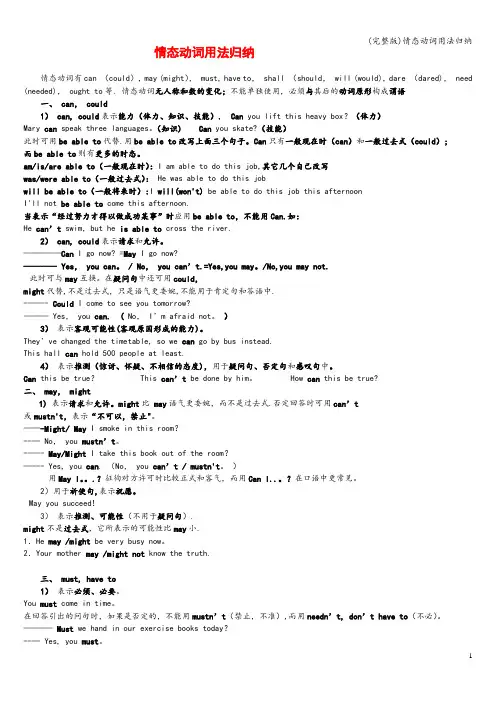
情态动词用法归纳情态动词有can (could), may (might), must, have to, shall (should, will (would), dare (dared), need (needed), ought to等. 情态动词无人称和数的变化;不能单独使用,必须与其后的动词原形构成谓语一、 can, could1) can, could表示能力(体力、知识、技能). Can you lift this heavy box?(体力)Mary can speak three languages。
(知识) Can you skate?(技能)此时可用be able to代替.用be able to改写上面三个句子。
Can只有一般现在时(can)和一般过去式(could);而be able to则有更多的时态。
am/is/are able to(一般现在时):I am able to do this job,其它几个自己改写was/were able to(一般过去式): He was able to do this jobwill be able to(一般将来时):I will(won't) be able to do this job this afternoonI'll not be able to come this afternoon.当表示“经过努力才得以做成功某事”时应用be able to,不能用Can.如:He can’t swim,but he is able to cross the river.2) can, could表示请求和允许。
—-———Can I go now? =May I go now?——-—- Yes, you can。
/ No,you can’t.=Yes,you may。
/No,you may not.此时可与may互换。
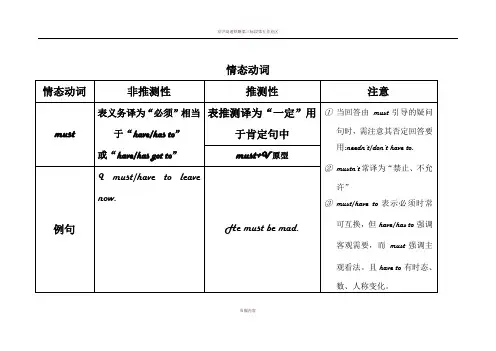
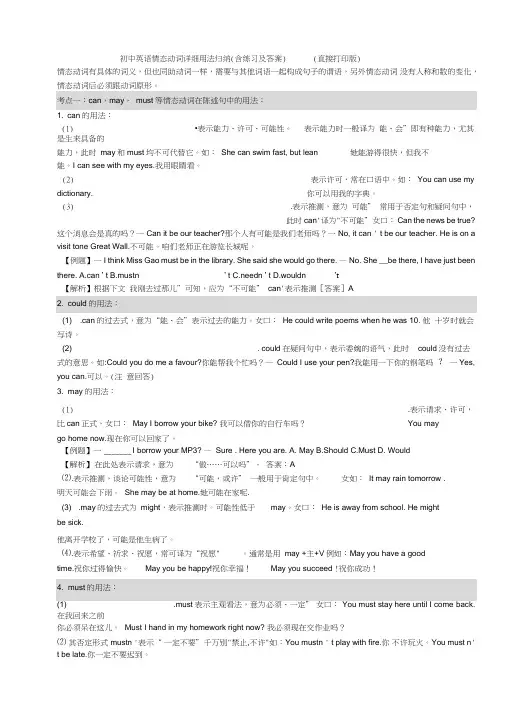
初中英语情态动词详细用法归纳(含练习及答案) (直接打印版)情态动词有具体的词义,但也同助动词一样,需要与其他词语一起构成句子的谓语,另外情态动词没有人称和数的变化,情态动词后必须跟动词原形。
1. can的用法:(1)•表示能力、许可、可能性。
表示能力时一般译为能、会”即有种能力,尤其是生来具备的能力,此时may和must均不可代替它。
如:She can swim fast, but lean 她能游得很快,但我不能。
I can see with my eyes.我用眼睛看。
(2)表示许可,常在口语中。
如:You can use my dictionary. 你可以用我的字典。
(3).表示推测,意为可能” 常用于否定句和疑问句中,此时can'译为"不可能”女口:Can the news be true?这个消息会是真的吗?一Can it be our teacher?那个人有可能是我们老师吗?一No, it can ' t be our teacher. He is on a visit tone Great Wall.不可能。
咱们老师正在游览长城呢。
【例题】一I think Miss Gao must be in the library. She said she would go there. —No. She __be there, I have just beenthere. A.can ' t B.mustn ' t C.needn ' t D.wouldn 't【解析】根据下文我刚去过那儿”可知,应为“不可能” can'表示推测[答案]A(1) .can的过去式,意为“能、会”表示过去的能力。
女口:He could write poems when he was 10. 他十岁时就会写诗。
(2) . could在疑问句中,表示委婉的语气,此时could没有过去式的意思。
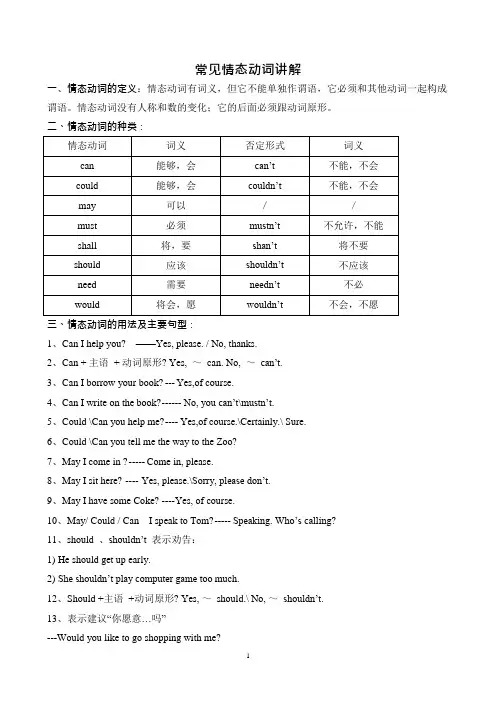
常见情态动词讲解一、情态动词的定义:情态动词有词义,但它不能单独作谓语,它必须和其他动词一起构成谓语。
情态动词没有人称和数的变化;它的后面必须跟动词原形。
二、情态动词的种类:三、情态动词的用法及主要句型:1、Can I help you? ——Yes, please. / No, thanks.2、Can + 主语+ 动词原形? Yes, ~can. No, ~can’t.3、Can I borrow your book? --- Yes,of course.4、Can I write on the book? ------ No, you can’t\mustn’t.5、Could \Can you help me? ---- Yes,of course.\Certainly.\ Sure.6、Could \Can you tell me the way to the Zoo?7、May I come in ? ----- Come in, please.8、May I sit here? ---- Yes, please.\Sorry, please don’t.9、May I have some Coke? ---- Y es, of course.10、May/ Could / Can I speak to Tom? ----- Speaking. Who’s calling?11、should 、shouldn’t表示劝告:1)He should get up early.2)She shouldn’t play computer game too much.12、Should +主语+动词原形? Yes, ~should.\ No, ~shouldn’t.13、表示建议“你愿意…吗”---Would you like to go shopping with me?---Yes, I’d love to. /I’d love to. But I’m busy now.14、就餐用语Would you like something to eat\drink? ---- Y es, I’d like…15、shall 用于第一人称(I, we), 可以表示“将”和表示建议“……好吗?”1)Where shall we have dinner?2)Shall we go fishing? ----- A ll right. \OK. \Good idea.16、Must + 主语+ 动词原形? ---Yes,~must.\No, ~needn’t.四.常见情态动词的区别:1.can (could)1)表示能力,could 主要指过去时间。
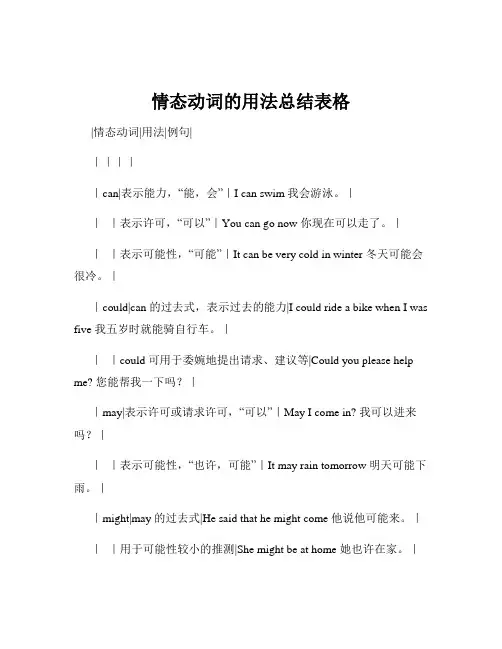
情态动词的用法总结表格|情态动词|用法|例句||||||can|表示能力,“能,会”|I can swim 我会游泳。
|||表示许可,“可以”|You can go now 你现在可以走了。
|||表示可能性,“可能”|It can be very cold in winter 冬天可能会很冷。
||could|can 的过去式,表示过去的能力|I could ride a bike when I was five 我五岁时就能骑自行车。
|||could 可用于委婉地提出请求、建议等|Could you please help me? 您能帮我一下吗?||may|表示许可或请求许可,“可以”|May I come in? 我可以进来吗?|||表示可能性,“也许,可能”|It may rain tomorrow 明天可能下雨。
||might|may 的过去式|He said that he might come 他说他可能来。
|||用于可能性较小的推测|She might be at home 她也许在家。
||must|表示必须,强调主观上的“必须”|You must finish your homework 你必须完成作业。
|||表示肯定的推测,“一定”|He must be very tired 他一定很累了。
||have to|表示客观上的“不得不”|I have to go now 我现在得走了。
|||有人称、数和时态的变化|She has to do a lot of housework 她不得不做很多家务。
||should|表示应该,常用来提出建议|You should study hard 你应该努力学习。
|||表示推测,“应该”|They should be there by now 他们现在应该到那儿了。
||ought to|同 should ,表示应该|You ought to listen to your parents 你应该听你父母的话。
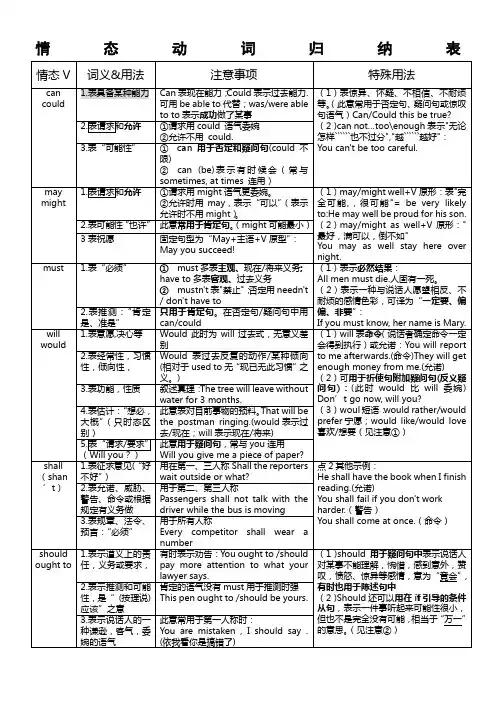
情态动词归纳表高考热点透视热点一:表猜测的情态动词的用法。
热点二:情态动词+have done情态动词+have done的用法有两种含义:1. 对过去情况的猜测。
由表猜测的情态动词+have done构成。
上表已经提到。
2. 表示与过去事实的主观设想。
有轻微的责备、后悔之意。
请参看下表:热点三:shall,will,must等1. Shall ①用于第一人称疑问句中表示说话人征求对方的意见或向对方请求。
例:—The room is so dirty. _______ we clean it?—Of course. ( 03 上海春招)A. WillB. ShallC. WouldD. Do②用于第二人称陈述句表示说话人或他人的意图、命令、允诺、警告、命令等。
例:“The interest _______ be divided into five parts, according to the agreement made by both sides,” declared the judge. (04 重庆,24)A. mayB. shouldC. mustD. shall2. Will ①表示意愿或意志。
例:I __________ argue with you.②当主语是物时,则表示“不起作用”。
例:The drawer _________ shut.3. Must 表“必须、一定要”。
例:— Who is the girl standing over there?— Well, if you _______ know, her name is Mabel. (02,天津)A. mayB. canC. mustD. shall。
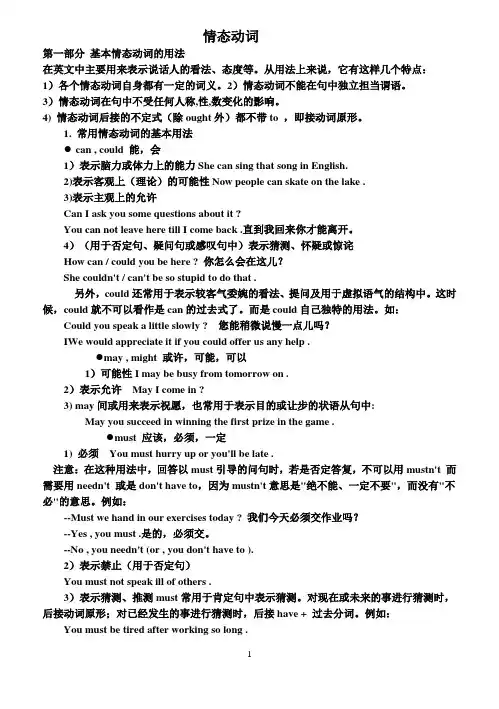
情态动词第一部分基本情态动词的用法在英文中主要用来表示说话人的看法、态度等。
从用法上来说,它有这样几个特点:1)各个情态动词自身都有一定的词义。
2)情态动词不能在句中独立担当谓语。
3)情态动词在句中不受任何人称,性,数变化的影响。
4) 情态动词后接的不定式(除ought外)都不带to ,即接动词原形。
1. 常用情态动词的基本用法●can , could 能,会1)表示脑力或体力上的能力She can sing that song in English.2)表示客观上(理论)的可能性Now people can skate on the lake .3)表示主观上的允许Can I ask you some questions about it ?You can not leave here till I come back .直到我回来你才能离开。
4)(用于否定句、疑问句或感叹句中)表示猜测、怀疑或惊诧How can / could you be here ? 你怎么会在这儿?She couldn't / can't be so stupid to do that .另外,could还常用于表示较客气委婉的看法、提问及用于虚拟语气的结构中。
这时候,could就不可以看作是can的过去式了。
而是could自己独特的用法。
如:Could you speak a little slowly ?您能稍微说慢一点儿吗?IWe would appreciate it if you could offer us any help .●may , might 或许,可能,可以1)可能性I may be busy from tomorrow on .2)表示允许May I come in ?3) may间或用来表示祝愿,也常用于表示目的或让步的状语从句中:May you succeed in winning the first prize in the game .●must 应该,必须,一定1) 必须You must hurry up or you'll be late .注意:在这种用法中,回答以must引导的问句时,若是否定答复,不可以用mustn't 而需要用needn't 或是don't have to,因为mustn't意思是"绝不能、一定不要",而没有"不必"的意思。
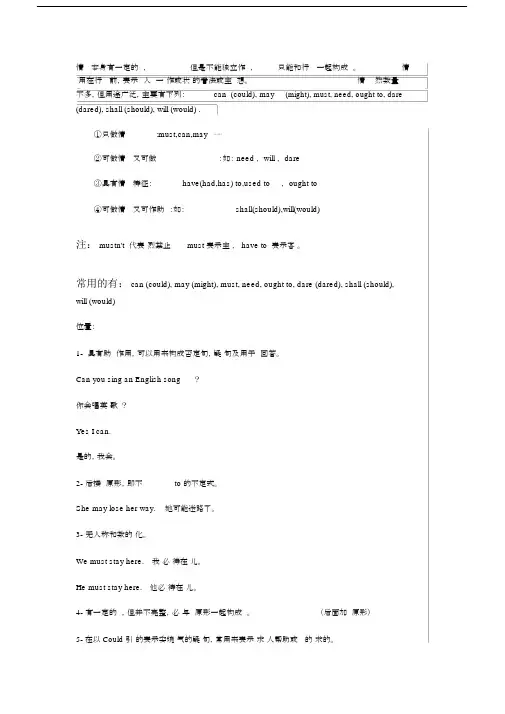
情本身有一定的,但是不能独立作,只能和行一起构成。
情用在行前,表示人一作或状的看法或主想。
情然数量不多,但用途广泛,主要有下列:can (could), may(might), must, need, ought to, dare (dared), shall (should), will (would) .①只做情:must,can,may⋯⋯②可做情又可做:如: need , will , dare③具有情特征:have(had,has) to,used to,ought to④可做情又可作助:如:shall(should),will(would)注: mustn't 代表烈禁止must 表示主, have to 表示客。
常用的有: can (could), may (might), must, need, ought to, dare (dared), shall (should), will (would)位置:1- 具有助作用,可以用来构成否定句,疑句及用于回答。
Can you sing an English song?你会唱英歌?Yes I can.是的,我会。
2- 后接原形,即不to 的不定式。
She may lose her way.她可能迷路了。
3- 无人称和数的化。
We must stay here.我必待在儿。
He must stay here.他必待在儿。
4- 有一定的,但并不完整,必与原形一起构成。
(后面加原形)5- 在以 Could 引的表示委婉气的疑句,常用来表示求人帮助或的求的。
如:( Could you come to my party on Saturday afternoon?)注意:这里不是情态动词的用法。
回答为:肯定:Yes ,I can./Sure./Certainly.否定:Sorry,I am afraid not.(在作否定回答时,要注意:在拒绝长辈的请求时,不能用can not,这样显得语气太过生硬,不礼貌。
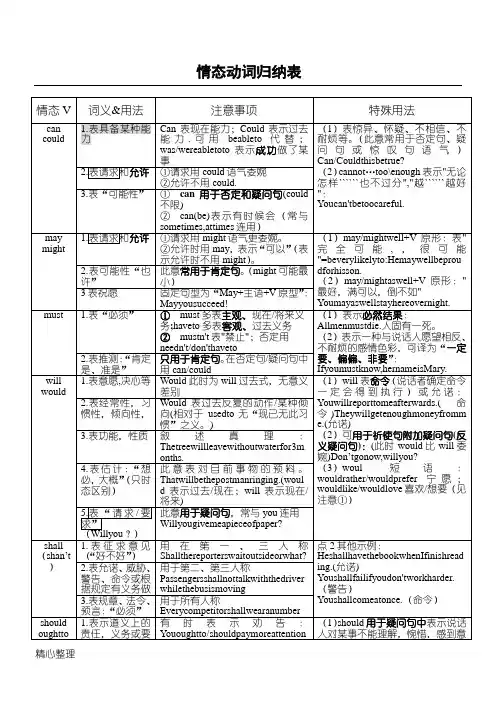
情态动词归纳表情态V词义&用法注意事项特殊用法can could 1.表具备某种能力Can表现在能力;Could表示过去能力.可用beableto代替;was/wereabletoto表示成功做了某事(1)表惊异、怀疑、不相信、不耐烦等。
(此意常用于否定句、疑问句或惊叹句语气)Can/Couldthisbetrue?(2)cannot…too\enough表示"无论怎样``````也不过分","越``````越好":Youcan'tbetoocareful.2.表请求和允许①请求用could语气委婉②允许不用could.3.表“可能性”①can用于否定和疑问句(could不限)②can(be)表示有时候会(常与sometimes,attimes连用)may might 1.表请求和允许①请求用might语气更委婉。
②允许时用may,表示“可以”(表示允许时不用might)。
(1)may/mightwell+V原形:表"完全可能,,很可能"=beverylikelyto:Hemaywellbeproudforhisson.(2)may/mightaswell+V原形:"最好,满可以,倒不如"Youmayaswellstayhereovernight.2.表可能性“也许”此意常用于肯定句。
(might可能最小)3表祝愿固定句型为“May+主语+V原型”:Mayyousucceed!must 1.表“必须”①must多表主观、现在/将来义务;haveto多表客观、过去义务②mustn't表"禁止";否定用needn't/don'thaveto (1)表示必然结果:Allmenmustdie.人固有一死。
(2)表示一种与说话人愿望相反、不耐烦的感情色彩,可译为“一定要、偏偏、非要”:Ifyoumustknow,hernameisMary.2.表推测:“肯定是、准是”只用于肯定句。
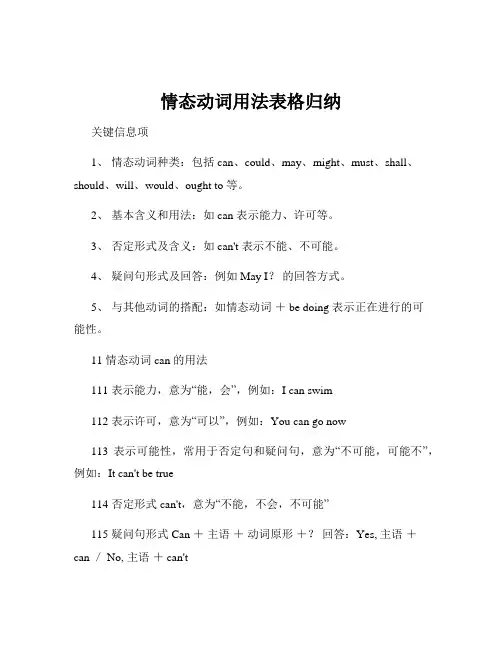
情态动词用法表格归纳关键信息项1、情态动词种类:包括 can、could、may、might、must、shall、should、will、would、ought to 等。
2、基本含义和用法:如 can 表示能力、许可等。
3、否定形式及含义:如 can't 表示不能、不可能。
4、疑问句形式及回答:例如 May I?的回答方式。
5、与其他动词的搭配:如情态动词+ be doing 表示正在进行的可能性。
11 情态动词 can 的用法111 表示能力,意为“能,会”,例如:I can swim112 表示许可,意为“可以”,例如:You can go now113 表示可能性,常用于否定句和疑问句,意为“不可能,可能不”,例如:It can't be true114 否定形式 can't,意为“不能,不会,不可能”115 疑问句形式 Can +主语+动词原形+?回答:Yes, 主语+can / No, 主语+ can't12 情态动词 could 的用法121 could 是 can 的过去式,用于过去时态,表示过去的能力、许可等,例如:He could play the piano when he was five122 could 可用于现在时,语气比 can 更委婉,例如:Could you help me?123 否定形式 couldn't,意为“不能,不会,不可能”124 疑问句形式 Could +主语+动词原形+?回答:Yes, 主语+could / No, 主语+ couldn't13 情态动词 may 的用法131 表示许可或请求许可,意为“可以”,例如:May I come in?132 表示可能性,意为“也许,可能”,例如:It may rain tomorrow 133 否定形式 may not,意为“可能不”134 疑问句形式 May +主语+动词原形+?回答:Yes, 主语+may / No, 主语+ mustn't14 情态动词 might 的用法141 might 是 may 的过去式,用于过去时态,表示过去的可能性、许可等,例如:He said that he might come142 might 可用于现在时,语气比 may 更委婉、不确定,例如:Might I have a word with you?143 否定形式 might not,意为“可能不”144 疑问句形式 Might +主语+动词原形+?回答:Yes, 主语+might / No, 主语+ might not15 情态动词 must 的用法151 表示必须,强调主观上的必要,例如:You must do your homework152 表示肯定的推测,意为“一定,准是”,例如:He must be at home153 否定形式 mustn't,意为“禁止,不许”154 疑问句形式 Must +主语+动词原形+?回答:Yes, 主语+must / No, 主语+ needn't16 情态动词 shall 的用法161 用于第一人称(I, we),表示征求对方的意见或建议,例如:Shall we go shopping?162 用于第一、三人称的疑问句,表示征求对方的意见或指示,例如:Shall he come in?163 用于第二、三人称,表示允诺、警告、命令、威胁等,例如:You shall fail if you don't work hard17 情态动词 should 的用法171 表示应该,常指义务或责任,例如:You should keep your promise172 表示推测,意为“按理应当,估计”,例如:They should be there by now173 否定形式 shouldn't,意为“不应该”174 疑问句形式 Should +主语+动词原形+?回答:Yes, 主语+ should / No, 主语+ shouldn't18 情态动词 will 的用法181 表示意愿、决心,例如:I will help you182 表示请求、建议,用于第二人称疑问句,例如:Will you please close the door?183 表示习惯性动作或客观事实,例如:Fish will die without water 184 否定形式 won't,意为“不愿意,不会”185 疑问句形式 Will +主语+动词原形+?回答:Yes, 主语+will / No, 主语+ won't19 情态动词 would 的用法191 would 是 will 的过去式,用于过去时态,表示过去的意愿、决心等,例如:He said he would come192 would 用于现在时,语气比 will 更委婉,例如:Would you like some coffee?193 否定形式 wouldn't,意为“不愿意,不会”194 疑问句形式 Would +主语+动词原形+?回答:Yes, 主语+ would / No, 主语+ wouldn't110 情态动词 ought to 的用法1101 表示应该,语气比 should 稍强,例如:You ought to obey the law1102 否定形式 ought not to,意为“不应该”1103 疑问句形式 Ought +主语+ to +动词原形+?回答:Yes, 主语+ ought / No, 主语+ oughtn't。
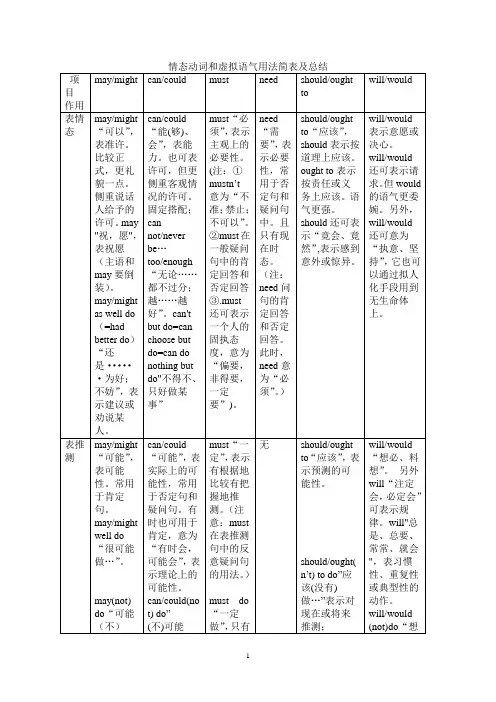
补充:1.根据情态动词表推测的确信程度大小可作如下排序:must>will>would>ought to>should>can>could>may>might2.shall的用法:(1)shall用于一、三人称疑问句中,表示征求对方的同意或向对方请示。
(2)shall用于二、三人称的陈述句中,表示说话人的允诺、保证、命令、威胁、警告、决心或者法律规章上的指示和规定等。
eg: ①Shall I open the window?②You shall get a new bike you want very much if you get the first prize in the coming exam.注:shall,will表示命令时的区别。
⑴shall指法律、规章、制度上的“必须”。
常用于正式文件中。
⑵will指责任、义务上的“必须”。
常用于日常交际中。
eg:①Each competitor shall wear a number.②No one will leave the examination room before ten o'clock.3.should的用法:⑴表意外,指说话人对某事不能理解,感到意外或惊异,意为“竟然,竟会”。
⑵表推测,指确定的或可能有的未来或希望,意为“应该”。
⑶表可能,常用在if条件句中,强调某事的可能性,意为“要是,万一”。
eg:①I am surprised that you should speak like that.②They should be ready by 12:00.③If he should come,please let me know.4.would与used to的区别(1)二者都可表示过去重复的习惯动作。
(2)表示过去的状态,只能用used to,不能用would.(3)used to强调过去与现在的对比,而would只表示过去习惯的动作,常与often、every day等状语连用。
(完整版)情态动词归纳总结情态动词归纳总结1.概念表示说话人对所说动作的观点,如需要、可能、意愿、怀疑等。
在形式上,情态动词一般没有人称和数的变化。
有的情态动词没有时态的变化,如must。
情态动词本身词义不完全,不能单独作谓语动词,必须和不带“to”的动词原形连用(即:其后动词必须为动词原形)。
2.常见的情态动词Can, may, must , have to,should, would.(dare , need , ought to )等3.用法1 .can1)表示能力We can speak a little English.2)表示许可Can I go out for a moment?-No,you can’t.3)表示请求Can you help me with my English?2 .mayMay/might既可表示现在的“可能”,也可表示将来的“可能”如:现在的可能:It may/might be true.He may/might be still waiting at the door.将来的可能:He may/might leave tomorrow.He may not/might not leave next week.注:can与may的区别在于:can表示“可能”往往指逻辑上的“可能性”;may表示可能则指事实上的“可能性”,如:Mr Green is in poor health.He can be ill at any ill.(逻辑的可能) Mr Green looks pale. He may be ill.(事实的可能)3.Must表示“必须”(带有命令,敦促的语气)You must read a book before you watch TV.You must be back in ten minutes.4.have to表示“不得不”,“必须”We have to be quiet in the library.注:must与have to有时可互换,但must表示说话人的主观意志和看法,语气比较强烈。
完整版)情态动词总结情态动词是用来表示说话人的语气和态度的,包括需要、愿意和怀疑等。
它们有一定的意义,但不完整,必须和主要动词的原形一起构成谓语。
常用的情态动词有:can、could、may、might、must、haveto、oughtto、should、will、would、need、dare、shall、be able to及半情态动词had better、would rather、have to、would like to。
下面是情态动词的基本用法:一、can1.表示能力“能……,会……”。
例如:A computer can’t think for itself。
it must be told what to do.2.表示许可,“能够……,可以……”;在疑问句中表示请求许可“能不能……,要不要……,用could表委婉语气,还可以用may”。
例如:You can go out to play when you ___.Can /Could /May I go now。
—Yes。
you can/may.Could you give me a lift to the n?3.表示猜测,通常用在疑问句中,表示惊讶、怀疑;用于否定句中,表示有把握的否定推测“不可能……”。
例如:Who can it be。
那会是谁呢?Can it be true?那会是真的吗?She can’t be waiting for you.她不可能在等你。
He can’t have gone there alone.他不可能独自一人到那儿去。
4.表示平时大部分时间不是这样,只是偶然发生。
“有时候会……”。
例如:Some ___ at home ___.Peter can be really hard to get along with even though he is a nice person in general.特别记忆:①can not/ can never…too…或___“再……也过分,越……就越好”。
情态动词归纳表高考热点透视热点二:情态动词 +have done情态动词+have done 的用法有两种含义:1.对过去情况的猜测。
由表猜测的情态动词+have done 构成。
上表已经提到。
1. Shall ①用于第一人称疑问句中表示说话人征求对方的意见或向对方请求。
例: — The room is so dirty. —Of course. ( 03 上海春招)2.表示与过去事实的主观设想。
有轻微的责备、后悔之意。
请参看下表:热点三: shall ,will , must 等t haveA. WillB. ShallC. WouldD. Dowe clean it?② 用于第二人称陈述句表示说话人或他人的意图、命令、允诺、警告、命令等。
例: “The interest _____ be divided into five parts, according to the agreement madeby both sides,A. mayB. shouldC. mustD. shall2. Will ① 表示意愿或意志。
例: I _________ argue with you.② 当主语是物时,则表示 “不起作用 ”。
例: The drawer __________ shut.3. Must 表“必须、一定要 ”。
例:— Who is the girl standing over there?—Well, if you ______ know, her name is Mabel. (02,天津 )A. mayB. canC. mustD. shalldec 重庆d th24Udge. (04。
(完整版)人教版初中英语各单元情态动词知识点汇总表人教版初中英语各单元情态动词知识点汇总表1. Unit 1: Can and Could- Can and could are used to express ability or possibility.- Can is used for present ability, while could is used for past ability or polite requests.- Example: I can swim. Could you help me with this?2. Unit 2: May and Might- May and might are used to express possibility or permission.- May is more formal and polite than might.- Example: It may rain tomorrow. May I go to the restroom?3. Unit 3: Must and Have to- Must and have to are used to express necessity or obligation.- Must is subjective, indicating a personal opinion or strong belief, while have to is objective, indicating a rule or external requirement.- Example: I must study for the exam. We have to wear uniforms.4. Unit 4: Should and Ought to- Example: You should visit the doctor. He ought to apologize.5. Unit 5: Need and Needn't- Need and needn't are used to express necessity or lack of necessity.- Need is used in positive sentences, while needn't is used in negative sentences or questions.- Example: You need to finish your homework. You needn't worry about it.6. Unit 6: Shall and Will- Shall and will are used to make offers, suggestions, or predictions.- Shall is used with "I" and "we" to make suggestions or ask for advice, while will is used with all pronouns and subjects to express future actions or intentions.- Example: Shall we go for a walk? I will help you with your project.7. Unit 7: Would and Should- Would and should are used to express hypothetical situations, requests, or polite offers.- Would is the past tense of will and is used to talk about unreal or unlikely situations.- Should is used to give advice or express expectations.- Example: If I had money, I would buy a new car. You should apologize to her.8. Unit 8: Can/Could/Will/Would you please...- Can/Could/Will/Would you please... is used to make polite requests or ask for help.- Example: Can you please lend me your pen? Could you please open the window?以上是人教版初中英语各单元情态动词知识点汇总表。
完整版情态动词(完整版)一、选择题1.It’s amazing that the pen ________turn voice into text with few mistakes.A.can B.must C.may D.need2.To my joy, we_________ go to the bank. Mary has lent us some money.A.shouldn’t B.needn’t C.couldn’t D.wouldn’t 3.—How do you like my new dress?—Well, if I ________ say, it is not suitable for you.A.may B.must C.have to D.should4.— Excuse me, could you tell me where the Nanjing Brocade Museum is?—Go along this road for five minutes. You ________ miss it. It’s a huge building.A.mu stn’t B.can’t C.needn’t D.shouldn’t 5.—Hurry up, Jack! Let’s cross the road as fast as possible.—No, you ________. Don’t you see the light is still red?A.couldn’t B.wouldn’t C.mustn’t D.needn’t6.—Be careful! Fire ________ be dangerous sometimes.—OK. I will put it out right away.A.mustn’t B.should C.can D.needn’t 7.—Dad, must we wait until the light becomes green?—Yes, I am afraid we ________. That’s the traffic rule.A.may B.can C.have to D.need8.Exercise is helpful but it ________ be regular (规律的) exercise.A.must B.may C.can D.need9.To avoid ________, we’d better ________ the parents’ meeting online.A.gather; hold B.gathering; hold C.gather; holding D.to gather; to hold 10.You'd better __________ hard from now on, __________ you will fail the exam. A.work; and B.working; or C.working; and D.work; or 11.Sorry, smoking is not allowed here. If you ________ , you will be fined according to the rules. A.can B.will C.may D.must12.If you buy your mum an iRobot floor cleaner, she ________ sweep the floor every day. A.can’t B.mustn’t C.needn’t D.shouldn’t 13.— Zoe, what do you think is the greatest advantage of shopping online?— At least I ______ spend much time going from shop to shop.A.shouldn’t B.can’t C.needn’t D.mustn’t14.The boy is very brave.I ________ he ________ the tall tree.A.dare say; dares to climbB.dare to say; dare climbingC.dare saying; dares climbD.dare to say; dares climbed15.My bike was broken yesterday,so I____walk home.A.might B.had to C.must D.could 16.—Would you please________in that way? That’s not safe!—Sorry. I won’t do it any more.A.not driving B.not to drive C.no driving D.not drive 17.—Ready? Let’s get started, Martin.— Swimming? I just ________ get used to it in winter.A.can’t B.needn’t C.mustn’t D.shouldn’t 18.Dr. Zhong Nanshan once said, "To prevent the spread of this disease, we________never be too careful."A.can B.may C.must D.should 19.Don’t cross the road until the traffic lights turn green. A car_______hit you.A.need B.may C.should D.must20.You ________ write the report again because spelling mistakes are not allowed at all. A.must B.can C.may D.could 21.—Excuse me. I haven’t finished reading the book yet. May I keep it a bit longer?— Sorry, you ________. You must return it on time.A.needn’t B.can’t C.won’t D.shouldn’t 22.—Must I finish all my homework today, Mum?—No, you ________, my dear. You can finish some tomorrow if you like.A.needn’t B.shouldn’t C.can’t D.mustn’t 23.Never throw objects from the building. Even a small object ________ cause serious injuries, or death, when dropped from a great height.A.must B.should C.may D.need24.—Will Jim come to Yangzhou for a holiday?—He ________come and it depends on how much homework he will have.A.may B.should C.must D.need25.—In China, many parents complain that their children have to stay up late to do the homework.—Don’t worry. The government has realized the problem. I’m sure there ________ be good news soon.A.can B.should C.need D.must26.I think all the students love the weekends because, to them, they ________ get up early on Saturdays or Sundays.A.mustn’t B.don’t need C.needn’t D.can’t27.— Is the boy over there Tom? He often wears a jacket like that.— It _______ be him. He is absent from school today.A.needn’t B.shouldn’t C.mustn’t D.can’t28.You ________ pay too much attention to protecting yourself if you plan to go abroad. A.mustn’t B.can’t C.shouldn’t D.needn’t29.Hurry up, or we ________ miss the beginning of the film.A.should B.must C.may D.have to30.Look at the floor, Tom! ________ you watch TV while having a meal?A.Should B.Could C.Must D.May31.—What is that young lady’s job?—She ________ be a nurse, I’m not sure.A.must B.may C.need D.would32.Cars ________ give way to walkers on some roads in Binhai, or the drivers will be fined. A.may B.will C.can D.must33.You’ve got an A in the maths test again. You ________ be good at it.A.can B.may C.must D.should34.—The article says that a person’s animal sign decides his personality.—You ________ read it for fun, but don’t believe i n that.A.can B.must C.shouldn’t D.needn’t 35.—How beautiful the winter jasmines (迎春花) are!—Yes. These golden-yellow flowers ________ be widely seen in my city in March.A.must B.can C.would D.should 36.—Who’s the man over there? Is that Mr. Black?—It ________ be him. Mr. Black is much taller than that man.A.may B.must C.can’t D.mustn’t37.—________ I see your ID card? We have to check your personal information.—Sure. Here you are.A.May B.Need C.Should D.Must38.We teenagers ________ have dreams. With dreams and hard work, anything amazing________ be created.A.may; can B.might; should C.should; can D.must; has to 39.—Do we have to finish this today?—Yes, you ________ . Today is the last day.A.would B.may C.can D.must40.—Must we stop the Japanese government discharging nuclear waste water (排放核污水) into the Pacific Ocean?—________. Because everyone should protect our earth and it is bad ________ us to eat the polluted seafood and drink the waste water.A.Yes, we can; of B.No, we mustn’t; of C.Yes, we must; for D.No, we needn’t; for 【参考答案】一、选择题1.A解析:A【详解】句意:神奇的是,这支笔能把声音转换成文字,而且很少出错。
情态动词归纳表
高考热点透视
热点一:表猜测的情态动词的用法。
热点二:情态动词+have done
情态动词+have done的用法有两种含义:
1. 对过去情况的猜测。
由表猜测的情态动词+have done构成。
上表已经提到。
2. 表示与过去事实的主观设想。
有轻微的责备、后悔之意。
请参看下表:
热点三:shall,will,must等
1. Shall ①用于第一人称疑问句中表示说话人征求对方的意见或向对方请求。
例:—The room is so dirty. _______ we clean it?
—Of course. ( 03 上海春招)
A. Will
B. Shall
C. Would
D. Do
②用于第二人称陈述句表示说话人或他人的意图、命令、允诺、警告、命令等。
例:“The interest _______ be divided into five parts, according to the agreement made by both sides,” declared the judge. (04 重庆,24)
A. may
B. should
C. must
D. shall
2. Will ①表示意愿或意志。
例:I __________ argue with you.
②当主语是物时,则表示“不起作用”。
例:The drawer _________ shut.
3. Must 表“必须、一定要”。
例:— Who is the girl standing over there?
— Well, if you _______ know, her name is Mabel. (02,天津)
A. may
B. can
C. must
D. shall。